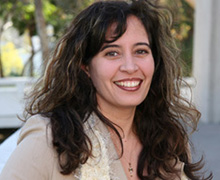Courses for culture

Courses for culture
- May 22, 2015
- School of Social Sciences introduces certificate program to encourage cultural awareness
-----
In our increasingly diverse world, knowledge and understanding of various beliefs,
cultures and customs is an invaluable asset in both a professional and personal sense.
It is this notion that inspired UCI social sciences lecturer Jeanett Castellanos (pictured),
along with the associate dean of undergraduate studies Mark Petracca and program coordinator
Kristen Salsbury, to begin developing the Cultural Competency certificate program
two years ago.
“Cultural understanding and competency is maximized at three levels; awareness, knowledge
and application,” Castellanos says. “And as America's face continues to change, cultural
training and competency are critical tools.”
The certificate—which will award its first graduates this year—is a part of the newly
adopted social policy and public service program, but may be completed in conjunction
with any major on campus. Requirements include a minimum of five social science courses
covering five topics: diversity in America, gender and sexuality, culture and politics,
global aspect, and history. Together, these classes help craft a well-rounded understanding
of diversity and globalization, promote social justice and develop leadership skills.
Ultimately, the goal of the certificate program is to send UCI grads into the world
with greater cultural understanding and tools for success.
Debbie Kol, a double major in international studies and literary journalism, will
be one of the first students presented with the certificate once she completes her
final required course in June.
“I think this program is really helpful and eye-opening,” she says. “It helps you
understand culture on a personal and international level.”
Anthropology and psychology student Melanie Velasquez, who will also be graduating
in June, agrees. “I think these are classes people should take regardless of their
major,” she says. “It’s very important to look deeply into these issues. They are
underlying with identity so everyone can relate to them.”
Of the courses that Kol took, her favorites included a course on transnational gangs
and one studying the culture and history of Vietnam and Cambodia. And while she was
interested in the latter for personal reasons—her family is Cambodian—the study of
transnational gangs was a completely new subject for her that she would not likely
be introduced to otherwise.
“The different requirements push you to take classes in different scopes that maybe
you weren’t interested in or you didn’t see as relevant,” she says. “So, it’s a learning
experience to broaden your horizons.”
Other applicable courses cover topics such as race and politics, immigration, psychology,
gender and health, and many more—allowing students plenty of freedom to customize
the program to their specific needs or interests.
Aside from personal growth, self-awareness and an overall better understanding of
the world, the cultural competency certificate is also designed to help students and
alumni stand out from competitors in the workforce and improve overall employee retention.
“Students’ exposure to different communities and cultures will expand their world
views while equipping them as professionals—and scholars—with culturally appropriate
knowledge and skills for their respective fields,” Castellanos explains.
Velasquez plans to apply to graduate school in the fall and work toward becoming an
occupational therapist. This summer she will be traveling on a missions trip to the
Philippines providing medical aide. She believes the courses she has taken to fulfill
the certificate requirements will be invaluable in both ventures, as working in the
medical field means working with people from all walks of life in sensitive situations.
“Especially when someone is sick and they don’t want to go to the clinic, if you can
relate to them it just makes it so much more comfortable for them and easier for them
to talk to you,” Velasquez says.
Kol, who hopes to apply for law school and start a career in international immigration
or civil rights law, believes that the certificate will not only make her resume stand
out from the pack, but also improve her own ability to interact with various members
of whatever community she is working with.
Other students who will be receiving their certificates this spring include anthropology,
sociology and psychology majors, and Castellanos envisions more variety as the program
becomes more well-known.
“I would especially encourage people outside of the social sciences to complete the
program,” Velasquez says. “It just gives you a broader spectrum of thinking about
identity issues and cultures. I believe the world would be a better place if more
people took these classes.”
—Bria Balliet, School of Social Sciences
-----
Would you like to get more involved with the social sciences? Email us at communications@socsci.uci.edu to connect.
Share on:
Related News Items
- Careet RightShock, shame after Oval Office meeting on Ukraine
- Careet RightFirst-rate advice for first-year and first-generation Anteaters
- Careet RightCastellanos named 2022-23 Chancellor's Faculty Award Recipient for Undergraduate Mentorship in social sciences
- Careet RightRiding the Academic Freedom Train: A Culturally Responsive, Multigenerational Mentoring Model
- Careet RightCastellanos elected to American Association of Hispanics in Higher Education Board of Directors


